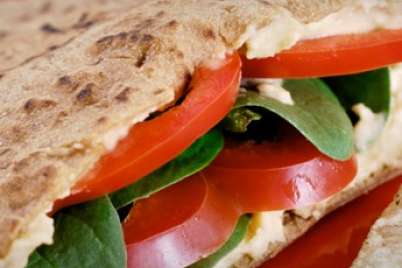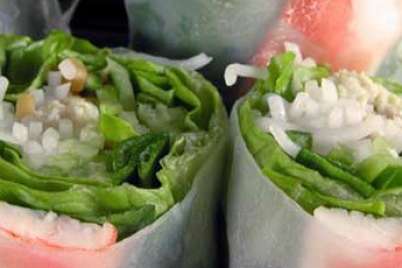
Get kids cooking with these easy recipes to try at home
Editor’s note: This article was produced in partnership with Meant2Prevent, a nonprofit Type 2 diabetes prevention organization that teaches parents, children, and youth about healthy lifestyle habits. Teaching your child to cook builds both confidence and fine motor skills—and is a fun way to fuel up before and after your active family adventures!
Kids can begin helping in the kitchen from the time they’re toddlers. Here are some ideas for age-appropriate kitchen tasks, along with recipes kids can learn to make on their own!
Remember: every child is different. There is no right or wrong time to learn any of the skills mentioned. The most important thing is that children learn how to cook and prepare food early on—and have fun while doing it!
Cooking with babies and toddlers
Children under two aren’t yet able to help with actual cooking, but it’s still a great idea to involve them in the kitchen. Invite your baby or toddler to smell, touch, and taste-test different ingredients. They also make great entertainers! Give them a pot and a wooden spoon to play and make music with while you’re cooking or preparing food.
This is a great age to introduce many different types of foods to your child. Provide age-appropriate finger foods that they can pick up and eat. Let them practice feeding themselves with spoons to help develop their fine motor skills.
Allow your child to explore different tastes and textures of food. A positive, stress-free environment to try new flavours can help reduce pickiness. Remember that it may take many times for a child to accept a new food. Keep offering, stay positive, and don’t give up.
Age-appropriate kitchen tasks
- Smell, touch, and taste ingredients and new foods
- Practice using hands and spoons to feed themselves
- Provide kitchen entertainment with pots and wooden spoons
Finger foods for babies and toddlers to try
- Broccoli Cheddar Egg Cups
- Walnut and Flax Carrot Cookie
- Cauliflower Tots
- Pumpkin Zucchini Muffins
- Hummus with pita or soft-cooked carrot sticks
Preschool kids love to “help”
Kids between the ages of two and five should always be supervised in the kitchen, as their motor skills are still developing.
This is a great age to introduce your child to cooking and get them excited about different foods. Sure, they may end up making more of a mess and take much longer to complete a task. Just remember: it’s all part of the learning process.
Encourage preschoolers to explore with their senses by touching, smelling, and tasting ingredients. Let them help by lining muffin trays, washing fruits or vegetables, and adding pre-measured ingredients into a bowl. Make sure they learn from a young age to always wash their hands before preparing food and after touching their mouth or face.
Age-appropriate kitchen tasks
- Wipe counters and tables
- Wash fruits and veggies
- Line muffin tins with paper cups
- Fold napkins for the table
- Pour pre-measured ingredients into bowl (with help)
- Stir batters
- Use cookie cutters to cut fun shapes out of fruit
Recipes to make with preschoolers
Ages 6-8: Time to learn knife skills!
Children in this age range are starting to become more independent, but still require close supervision in the kitchen. Keep encouraging them to participate and try new foods. You can even start involving them in grocery shopping and planning meals or snacks.
This is also a great time to start teaching safe knife-handling skills. Let your children cut soft fruit and vegetables with plastic or dull knives, and show them how to protect their fingers when cutting!
Six- to eight-year-olds will have a bit more dexterity and can learn to peel vegetables with a peeler and measure dry ingredients themselves. You can even start teaching them how to crack eggs! Make sure to include your kids in cleaning, wiping up spills, and setting or clearing the table as well.
At this age, your child can start to make some snacks on their own with less supervision. Try having them build their own sandwich, or add toppings to pizzas. Encourage their creativity by inventing new recipes, like a fun new smoothie to try!
Start teaching your child the importance of making your meals balanced by including vegetables, fruits, whole grains, and protein foods. Check out Canada’s Food Guide for more information.
Age-appropriate kitchen tasks
- Teach how to make a balanced meal or snack by including vegetables, fruits, whole grains, and protein foods
- Help with meal planning by identifying ingredients needed for their favourite snack or meal
- Learn to read a recipe and help to find and identify ingredients
- Use simple equipment like a grater, peeler, or toaster
- Cut soft fruits like bananas with plastic knife
- Set and clear the table
- Measure dry ingredients
- Spread ingredients on bread (cream cheese, nut butters, pizza sauce)
- Build simple recipes like sandwiches, pizzas, and smoothies
- Crack eggs
- Grease pans
- Invent new recipes to try
Easy recipes school-aged kids can learn to make on their own
- Make Banana Nut Butter Toast
- Make Apple Bagels (have an adult cut the apples!)
- Stir together Chia Pudding
- Decorate a Banana Split Breakfast
- Make Tortilla Roll Ups
- Assemble a yogurt parfait
Get your tween involved in meal planning and grocery shopping
Between nine and 12, children can have more independence in the kitchen, although it’s still recommended to supervise them while cooking. Make sure they know how to use knives and kitchen utensils safely, and how to operate appliances, including the oven, stove, microwave, and blender.
By 12 years old, preteens should be able to read a recipe, find ingredients, and cook or bake simple recipes with minimal supervision.
This is a great time to get your child even more involved in meal planning and grocery shopping. Try letting them plan a meal for the family one day per week, and come up with healthy snack ideas. They can even help make and pack their school lunches!
Age-appropriate kitchen tasks
- Clean dishes and put them away
- Read recipes
- Measure wet and dry ingredients on their own
- Use a knife safely
- Plan healthy meals and snacks
- Use the stove or oven with minimal supervision
- Cook or bake simple recipes with minimal supervision
- Prepare mug muffins in the microwave or smoothies in the blender
Simple, healthy recipes for tweens to try
- Mug Muffins
- Broccoli Cheddar Egg Cups
- Smoothies
- Banana Nut Butter Bites
- Personal Pancakes
- Tortilla Roll Ups
- Guacamole
- Almond Coconut Energy Bites
- Chocolate Sweet Potato and Zucchini Muffins
- Fruit Squares
- Shrimp Spring Rolls
Remember that every child is unique and their comfort level with certain kitchen tasks may be different than the suggestions listed here.
Cooking is good for kids
When kids are comfortable in the kitchen from an early age, it teaches them important life skills. It also helps to improve their math, problem-solving, literacy, and fine motor skills.
Studies also show that involving your kids in the kitchen early in life can help them develop healthy eating habits as they grow. Independence in the kitchen encourages children to explore new foods, which may help to reduce picky eating. When your child has helped create something, they are much more likely to want to try it!
As your child grows and gains some basic food skills, they can start to do more on their own in the kitchen.
Getting your child involved with cooking and meal planning early can help them build a healthy relationship with food and decrease picky eating. It can be a fun activity to do together too, at any age!





